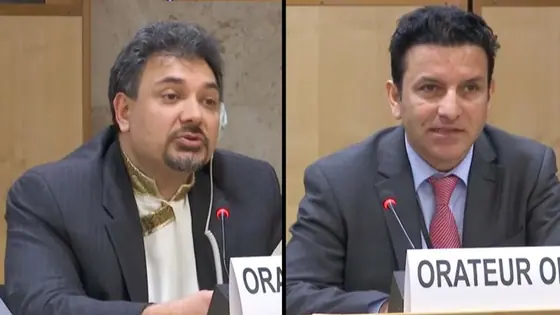
Pakistan violating human rights in PoK, Gilgit: activists at UNHRC
Political activists from PoK and Gilgit Baltistan have asked the UN Human Rights Council to protect their rights and save them from Pakistan's oppression
Geneva: Political activists from PoK and Gilgit Baltistan have asked the UN Human Rights Council to protect their rights and save them from Pakistan's oppression. Speaking at the 43rd Session of Human Rights Council in Geneva, Nasir Aziz Khan, an activist from PoK said, “We are seriously concerned about growing human rights violations taking place in so called Azad Kashmir (PoK) and Gilgit Baltistan, whereby peaceful political activists and members of civil society have become targets of state infrastructure.” He added, “Terrorists’ network and infrastructure are very much intact in these areas. Leaders of banned terrorist organisations are roaming freely. Despite FATF recommendation High-profile Pakistan Taliban leader Ehsanullah Ehsan, who acted as the group's spokesman and claimed responsibility for some of its deadliest attacks, has escaped from military custody, Pakistan's interior minister confirmed.”

“Designated as a terrorist at UN sanctions list Leader of Jaish-e-Mohammed (JeM) Maulana Masood Azhar who was in the custody of Pakistan army, also escaped along with his family. It shows that Pakistan still supports them. She is not serious to take action against extremist and terrorists organizations and groups,” Nasir told the Council. He also urged the HRC to ask Pakistan to take effective measures to control activities of those who promote extremism, violence and intolerance in the region. “HRC should ask Pakistan to release all peaceful political prisoners including Baba Jan and Iftikhar Hussain and their colleagues who were trailed under Anti-Terrorist Act and facing 40 to 80 years imprisonment,” said Nasir Senge H. Sering, an activist from Gilgit Baltistan said in his intervention, “China Pakistan Economic Corridor or CPEC passes through Gilgit-Baltistan and locals claim representation and revenue-share in CPEC as third and equal partner since both Pakistan and China lack sovereignty over this territory. Locals oppose unconstitutional land reforms and unconstitutional ordinance of 2020 imposed by Pakistan, as both rob locals of decision or control over land and cultural identity while empowering Pakistanis and Chinese to abuse common property regime with impunity.” He urged Pakistani regime to respect freedom of speech and movement and refrain from declaring locals terrorists for demanding self-rule and share in CPEC. “I urge Pakistan to release political prisoners including dozens serving life-term,“ Senge told the Council. He added, “Pakistan must not treat Gilgit-Baltistan as prison for locals and open routes towards Ladakh and Afghanistan. This will help divided families reunite and enable Buddhists of Ladakh visit religious sites in Gilgit-Baltistan. Locals ask: If Indian Sikhs are welcome to visit Kirtarpur Saheb in Pakistan, then why are Ladakhi Buddhists deprived of similar right of religious freedom? Why the double standards, Pakistan?”
“I remind Pakistan and China about their commitment to promotion and protection of human rights including accountability for violations, and request both to cooperate fully with the Council when dealing with disputed territories like Gilgit-Baltistan. This includes complete withdrawal from the territory to enable genuine stakeholders solve the chronic political impasse,” said Senge.